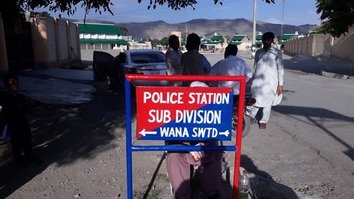PESHAWAR -- Courts in the tribal districts of Khyber Pakhtunkhwa (KP) are up and running as local authorities extend civilian policing in the region.
"One of the dreams of many tribe members came true after regular courts began working on March 11 and the public received a forum to seek justice," Ajmal Khan Wazir, a spokesman for the KP government and advisor to the KP chief minister for merged districts, told Pakistan Forward.
The move is part of the mainstreaming of the erstwhile Federally Administered Tribal Areas (FATA) that were merged with KP in 2018. No court system has existed in FATA until now.
Tribe members were subject to a draconian, separate legal system, the colonial-era Frontier Crimes Regulation (FCR), which was abolished in the merger.
"The access of courts has been discussed in detail, and the first batch of police officers are ready to move" into the merged districts, Kamran Khan Bangash, special assistant to the KP chief minister and provincial cabinet member, told Pakistan Forward after a cabinet meeting on March 13.
"The chief minister has ordered the process of the merger to be expedited, and it was decided that the issues of tribal districts will be the top priority at all cabinet meetings, which are supposed to occur every 15 days," Bangash said.
Cases under way
The cabinet during the meeting March 13 formed a three-member committee to decide cases that were previously registered under the FCR.
The cabinet also decided that deputy commissioners will arrange for the venues of permanent courts in their respective districts, as the temporary courts set up in the adjoining districts will continue working for only two more months.
As many as 28 judicial officers -- including seven district and sessions judges -- and 14 civil judges have taken their positions in the newly merged districts. Shahid Khan was appointed district and sessions judge in Khyber, Asghar Shah in Orakzai, Asad Hameed in Mohmand, Nasruallah Khan in Bajaur, Salahuddin Khan in Kurram, Kareem Arshad in South Waziristan and Mamrazi Khan in North Waziristan.
The Peshawar High Court March 2 conducted an orientation session for the judicial officers posted in the districts.
Senior civil judge Zafarullah Khan heard the first case of the new courts in Khyber District March 11. The case concerned a student's admission into a university.
New police stations approved
The KP government also approved the opening of 25 police stations in the merged districts on March 8, with at least one to be initially set up in every subdivision.
"The government has approved 25 police stations in the merged districts after the summary sent by the police and the Home Department was approved," Kokab Farooq, spokesperson for the KP Police, told Pakistan Forward.
Khyber, Mohmand, Kurram, North Waziristan and South Waziristan will each get three police stations, according to Farooq. Bajaur and Orakzai will each get two. One station has been approved in the former frontier regions of Darazinda, Jandola, Hassankhel, Dara Adamkhel, Wazir and Bhittani.
The KP government also declared 13 lock-ups in the tribal areas as sub-jails under the KP Prisons Department and announced plans to deploy 152 personnel to those locations.
South Waziristan will be part of the Dera Ismail Khan region of police, North Waziristan will be with the Bannu Range, Kurram and Orakzai in Kohat Range, Khyber in Peshawar Range, Mohmand in Mardan Range and Bajaur in Malakand Range, said the KP government in early March.
The administrative set-up allows regional police officers to start formal supervision of policing in these districts.

![Peshawar police officers patrol near the border with Khyber District in Karkhano Market March 1. [Javed Khan]](/cnmi_pf/images/2019/03/20/17159-fatapolice-585_329.jpg)







Which regulation or law will govern new merger areas?
Reply3 Comment(s)
This is not just absolute barbarity but also a robbery at the rights of tribesmen. This integration is not acceptable to us at all.
Reply3 Comment(s)
Yes
Reply3 Comment(s)